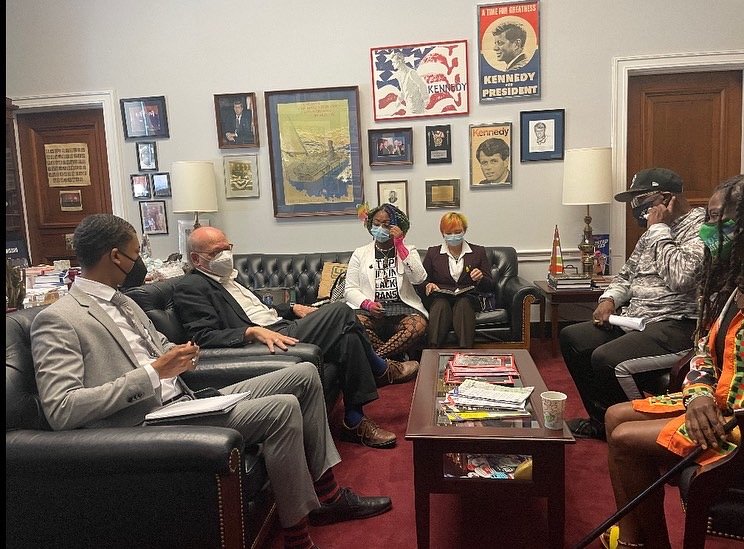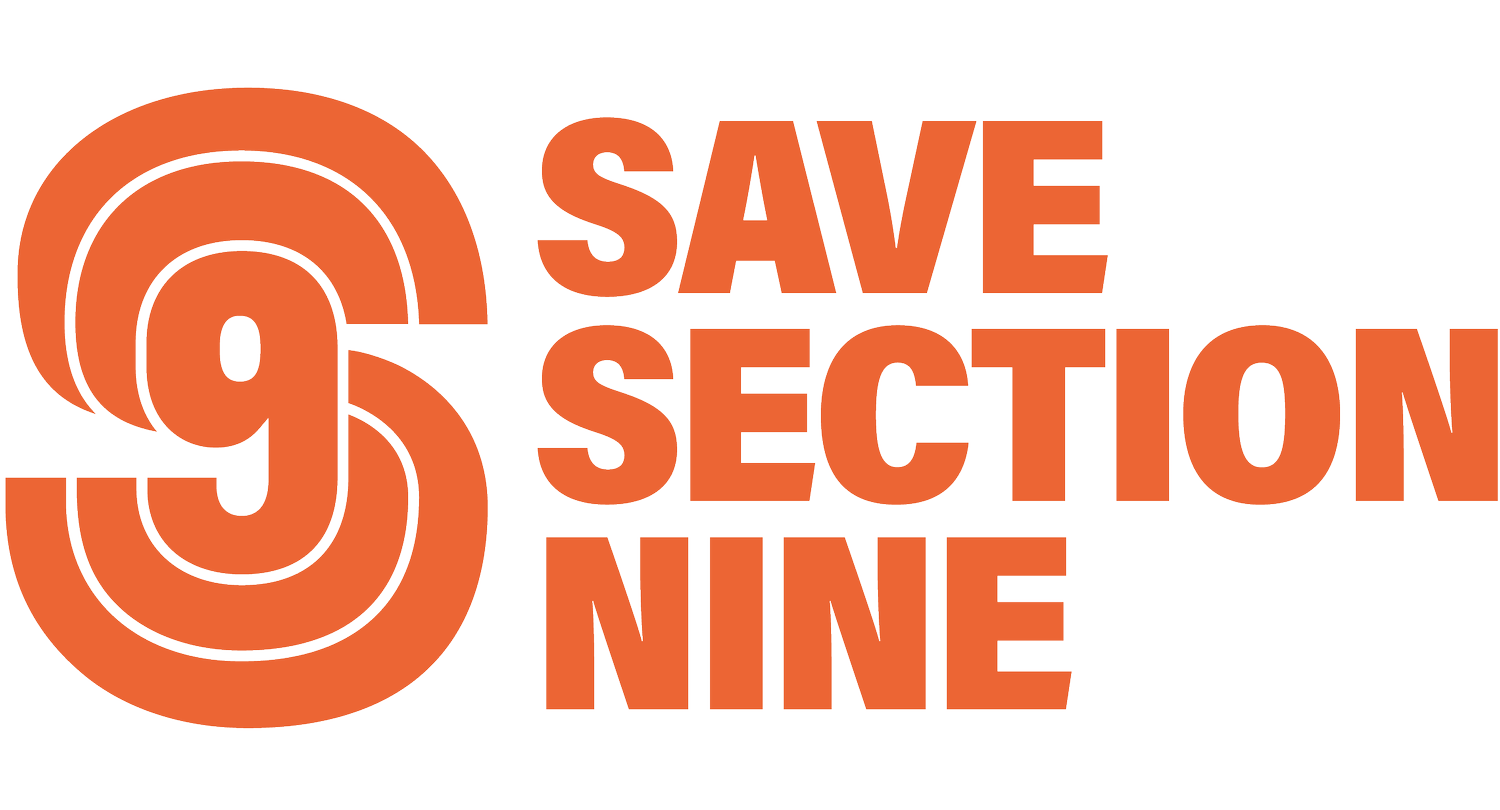Collective Solutions
Below are our collective solutions to preserve and expand public housing. These include solutions for each city with tenants and allies represented in Save Section 9, as well as a shared set of federal solutions.
FEDERAL SOLUTIONS
Instruct HUD to place a moratorium on privatizations via RAD/ PACT and Section 18. The privatization of public housing has led to an erosion of rights and protections for tenants. A moratorium must be issued immediately and remain, at least, until #2 is completed.
Conduct a thorough impact study of all project-based Section 8 privatizations that includes cost of operation per unit nationally. HUD must conduct an impact study of project-based Section 8 and other privatization programs being implemented nationally. In order to properly manage Section 9, housing authorities need to receive fiscal support in line with their operating costs. HUD must analyze housing stocks throughout the country to determine the operating costs, and ensure Congress, and state and local governments are meeting the operational cost needs of each housing authority.
Democratize the process by which Section 18 & Section 8 project based approval processes are granted by demanding a minimum threshold of tenant participation. Once impact studies are completed Tenants that now live under RAD/ PACT or Section 18 should be afforded a right to return to Section 9.
Issue a national state of emergency for Section 9 housing. The conditions in public housing are deplorable and violate our human rights. In order to expedite adequate fiscal allocations and ensure that federal oversight leads to real change for tenants, a state of emergency must be issued for all Section 9 public housing.
Reinstate federal and tenant oversight of public housing authorities. The US Department of Health should step in as HUD has demonstrated they are unable to assess and remediate hazards public housing tenants face. FEMA should provide resource allocation to ensure corruption doesn't lead to any further misappropriation of funds. A robust tenant-led governing body must be created to oversee and directly inform federal oversight and hold officials accountable to residents' needs.
Allocate $100B to Section 9 for rehabilitation immediately and create a framework to increase funding to $180B by 2025. The Housing Act of 1937 made Congress financially responsible for funding Section 9. Their failure to do so has turned 970,000 units into slums. Between 1980 and 1988 Congress slashed investments in Section 9 in half. This trend must be reversed. Privatization is not a viable solution; fund Section 9 now and in perpetuity.
Restore the Section 9 housing stock to 1999 numbers and work to fully repeal the Faircloth Act by 2025. Since 1999, we have lost Section 9 units to disrepair stemming from government neglect. We must restore the stock to allowable limits and expand the Section 9 housing stock by repealing the Faircloth Amendment. This is key to addressing the national housing crisis. We also must uncouple the repeal of Faircloth and RAD, which is a giveaway to the private sector that will only lead to more harm for tenants, the loss of public land, the further concentration of wealth; worsening political inequality.
Support the sustainable and resilient rehabilitation of public housing campuses and units. Components of the GND4PH must be incorporated into any legislation addressing the conditions within public housing. SEC. 40006 of the Build Back Better bill must be expanded to include Section 9 public housing.
Ensure that racist and derogatory beliefs surrounding public housing do not continue to impact policy making. We reject the racist and classist language in the bill that suggests our communities do not “function” (BBB SEC. 40001.3). Poor communities have repeatedly been impoverished by bad policy decisions like those that further the privatization and financialization of public housing. We oppose the choice neighborhood initiative and any actions that would displace poor communities.
Create reporting infrastructure to allow Section 9 tenants to report their rent to major credit agencies. Upward mobility is often not available to public housing tenants due to the importance of credit scores. Allowing tenants to build their credit by paying their rent on time is an easy and fair solution to the challenges we face in developing a credit history.
Issue guidance on what “affordable housing” is. Current metrics of affordability do not create fair and equitable housing. A 30% cap is needed nationally to address the current housing insecurity and homeless crisis and counter the lack of extremely low income.
LOCAL SOLUTIONS
New York City
Conduct a forensic audit of NYCHA by the end of fiscal calendar 2023.
Immediately create a new organizational plan that prioritizes the management and expansion of public housing in NYC and does not pursue or support the privatization of Section 9. This organizational plan should bring more tenants to the decision-making table in multiple ways. It would immediately make the 2020 NYCHA organizational plan obsolete. We want this organizational plan to be inspired by the operational plans of 1965- 1970.
North Carolina
Tenant leaders should be coached and supported to ensure that they can properly represent their neighbors. Specifically, leaders should be taught money management and leadership skills.
Public housing tenants should be developed or encouraged to participate in the decision making process by local leadership. This is a violation of our rights! HUD must oversee and ensure that educational outreach takes place.
HUD should develop clear materials that allow tenants to better grasp the differences between Section 8, Section 9 and Project Based Section 8.
Memphis
Make housing assistance more accessible to the Illiterate and to the differently abled. The average reading level is 3rd grade in Memphis. Too many people miss out on housing assistance despite the fact that they qualify because the barriers of entry require more than that person in need is capable of. People with ADHD and other learning disorders need institutions willing, and able to work with them.
Audit and criminally charge Memphis Housing Authority and other nonprofits with embezzlement of public funds. Memphis Housing Authority does not meet the definition of financial accountability. They take federal money that’s supposed to be used for affordable housing and redirect them for pet projects.
Better integrate public housing with the surrounding community. People in need of assistance or who are differently abled or are elderly should not live seperate or held in obscurity from the general community.
Better architecture design for community building. Gating people off from the public eye creates an isolated environment where abuse and exploitation of the needy can run rampant. Public housing architecture should promote an environment where the people who live there feel connected to the world around them. People should not be placed in decrepit towers to be neglected like the buildings themselves. Also Memphis is on a fault line and architecture should be designed around that fact.
Community members should be the ones who manage public housing. When someone lives in a community they are more willing to take proper care of said community. Any one who works in public housing should at the very minimum live in the same area code.
Public oversight committees must be established and given subpoena power. Far too long the Memphis public have been defrauded of their tax money. Give the people the power to bring embezzlers of public funds to Justice. People may find the words human rights violation hard to understand but the term lawsuit is universal.
Give public housing residents the ability to become owners. Have the people be invested in the community that they live in. Millions were given in forgivable PPP loans; the same thing should be done for the most vulnerable of the community.
Provide subsidies and full reimbursement for renters for building repairs and environmental upkeep. The homes that we live in are a part of our everyday environment. The environment should be treated as an extension of Public health. Maintenance of Public Health should be encouraged. the Homestead Act of 1862, which provided 160 acres of federal land to anyone who agreed to farm the land. The act distributed millions of acres of western land to individual settlers.
All misappropriated funds recovered should be paid directly to the tenants of public housing via tax credit or non taxable funds. Millions of millions of dollars, through the non-profit industrial complex, have been stolen from the public under the guise of helping the homeless and the needy. Whatever that will be recovered should be given to the people directly. They would know what to do better than those that have been stealing from them.
Turn establishments used for public housing services into places where people can also vote. Many people that require housing assistance also lack transportation. Housing discrimination is also voter discrimination.


